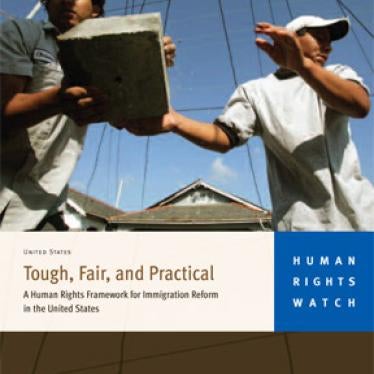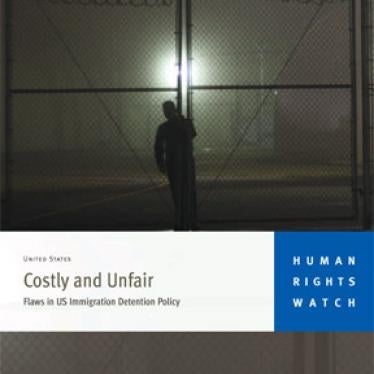John Morton
Director
Immigration and Customs Enforcement
500 12th Street SW
Washington, DC 20536
John Gage
National President
American Federation of Government Employees
AFL-CIO
80 F Street NW
Washington, DC 20001
Re: Human rights obligations in the context of immigration detention
Dear Director Morton and Mr. Gage:
Thank you for your commitment to improve the United States' immigration detention system. As you continue to work together on this effort, Human Rights Watch would like to restate its position on the immigration detention system in the United States and how it currently fails to meet international human rights obligations.
Immigration detention is not criminal punishment, and not supposed to be a punitive sanction. Immigration detention serves to ensure that a person appears at immigration hearings and does not abscond. Modeling detention facilities and detention practices after the criminal justice system is not the correct way forward. As Secretary Napolitano has stated, "The paradigm was wrong."
While there will continue to be a need to securely detain persons convicted of violent offenses who are subject to immigration proceedings in a manner more similar to the criminal justice prison model, Immigration and Customs Enforcement (ICE) also detains thousands of non-criminals and non-violent offenders every day due to the mandatory detention provision in the Immigration and Nationality Act (INA). We therefore strongly support ICE's efforts to expand the use of alternatives to detention and to modernize detention facilities in order to make them more civil in nature. We believe that ICE employees and management have the capacity and creativity to address these issues in reforming the detention system.
As these discussions move forward, we emphasize the need for attention to the government's human rights obligations in the context of detention. In particular, we note the following concerns that have emerged in the course of our research:
1. The right to not be unnecessarily or arbitrarily detained.[1]
Human Rights Watch, in Forced Apart (By the Numbers) (April 2009) and Costly and Unfair (May 2010), has reported on the excessive scope of the mandatory detention provision of the INA, resulting in the unnecessary detention of non-violent, non-criminal immigrants, including many lawful permanent residents who are not a flight risk. We trust that the National ICE Council, like other national correctional officers organizations, is not interested in holding in custody non-citizens other than those who must necessarily be detained in order to achieve legitimate government purposes, such as preventing persons from absconding from trial. We also encourage ICE to push for greater use of alternatives to detention for non-criminal immigrants in proceedings.
2. The right to contest the grounds for deportation.[2]
Human Rights Watch has also reported on the devastating impact on immigrant detainees of unnecessary transfers between detention facilities. We have been patiently waiting since February 22for a promised transfer policy that addresses our concerns regarding the negative impact of transfers on a detainee's access to counsel, witnesses, and evidence and on their relationship with family members. At the same time, we do express our appreciation for the establishment of the Online Detainer Locator System to help locate detainees if they are subject to a sudden transfer.
3. The right of all persons deprived of their liberty to be treated with humanity and with respect for the inherent dignity of the human person.[3]
Human Rights Watch has documented dozens of instances in which detained women reported having struggled to obtain important healthcare services such as Pap smears to detect cervical cancer, mammograms to screen for breast cancer, prenatal care, and counseling for survivors of violence, and even basic supplies such as sanitary pads or breast pumps for nursing mothers.
Human Rights Watch is further concerned about the impact of current detention policies on persons with mental disabilities, many of whom are not properly identified as such by ICE, and for whom detention interrupts mental health treatment in the community and may exacerbate symptoms and suffering related to mental illness.
We welcome both the development of a standard on women's health in the new detention standards and the recent efforts by ICE to address the needs of persons with mental disabilities in detention. We strongly recommend the swift promulgation and implementation of the revised detention standards to safeguard the health needs of all persons in detention, we reiterate our call for the government to establish legally enforceable standards to govern conditions of detention, and we urge ICE to ensure that all policies on detention of persons with mental disabilities require placement in the least restrictive setting.
4. The prohibition of cruel, inhuman, or degrading treatment or punishment.[4]
Human Rights Watch has serious concerns regarding sexual assault and abuse within detention facilities. Following the emergence in May of allegations that a guard at the T. Don Hutto Residential Center had assaulted several female detainees, Human Rights Watch compiled documented incidents and allegations of abuse since the establishment of ICE in 2003.[5] Due to a shortage of publicly available data, the extent to which ICE detainees are subject to sexual abuse nationwide is unclear, but the known incidents point to gaps in detention policy, practice, and oversight. Our findings echo the assessment made by
Dr. Dora Schriro one year ago: "The system must make better use of sound practices such as ... practices that comply with the Prisoner Rape Elimination Act." The revised standard on sexual assault and abuse prevention and intervention included in the new set of detention standards is a significant step in that direction.
To close, we note that Director Morton announced several new detention reforms over a year ago. Some of these initiatives, according to a September 28 Houston Chronicle article, are on hold pending bargaining. We urge both parties to move expeditiously to continue to implement these initiatives.
We appreciate the engagement of ICE management and the American Federation of Government Employees on these important matters. We urge both parties to recognize the necessity of meeting basic human rights obligations in immigration detention policy and practice. We are available to discuss with you any questions or concerns you may have related to this correspondence or our reports.
Sincerely,
Antonio Ginatta
Advocacy Director, US Program
Human Rights Watch
[1] International Covenant on Civil and Political Rights (ICCPR), adopted December 16, 1966, G.A. Res. 2200A (XXI), 21 U.N. GAOR Supp. (No. 16) at 52, U.N. Doc. A/6316 (1966), 999 U.N.T.S. 171, entered into force March 23, 1976, ratified by the United States on June 8, 1992, art. 9(4).
[2] ICCPR, art. 13.
[3] ICCPR, art. 10.
[4] Convention against Torture and Other Cruel, Inhuman or Degrading Treatment or Punishment (Convention against Torture), adopted December 10, 1984, G.A. res. 39/46, annex, 39 U.N. GAOR Supp. (No. 51) at 197, U.N. Doc. A/39/51 (1984), entered into force June 26, 1987, ratified by the United States on October 21, 1994, art. 1, 16(1).
[5] Human Rights Watch, Detained and at Risk: Sexual Abuse and Harassment in United States Immigration Detention, August 25, 2010, https://www.hrw.org/en/reports/2010/08/25/detained-and-risk (accessed October 5, 2010).








